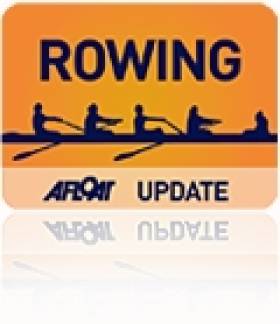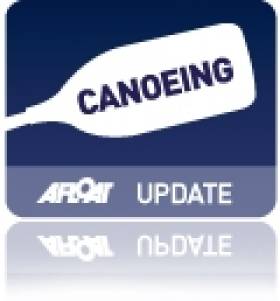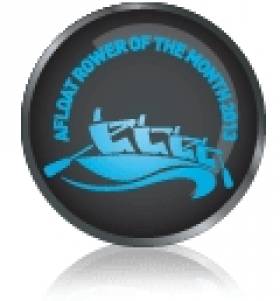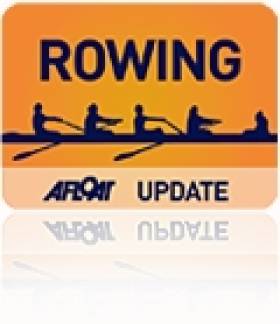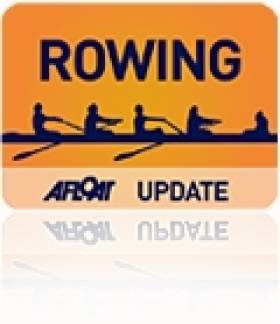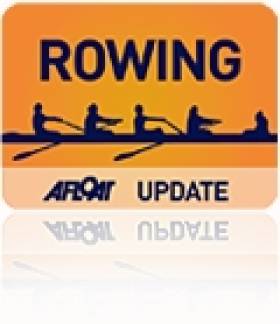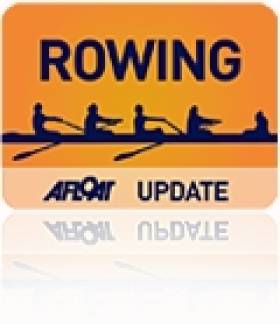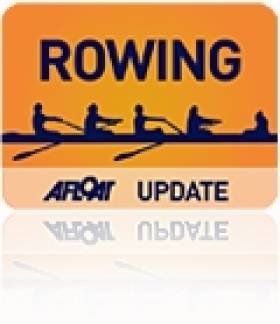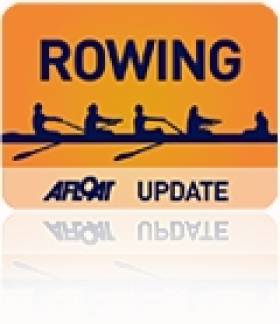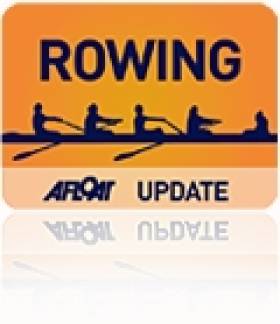Displaying items by tag: European Championships
#ROWING: Siobhán McCrohan and Sinéad Jennings dead-heated in the shoot-out for the place in the lightweight single sculls at the European Championships. The race was held over 1500 metres because of a powerful tailwind at the National Rowing Centre, and neither sculler could draw clear of the other in a stirring contest. McCrohan started and finished well, while Jennings did well in the middle stages. The two are set to race again over 1500 metres on Friday or Saturday.
#CANOEING: Ireland’s Liam Jegou finished fourth in the final of the Canoe Slalom European Junior Championships in Skopje in Macedonia today. The C1 competitor did very well in his semi-final and actually was the fastest man in the final, but the four second penalty for two touche on gates cost him a medal. He will team up with Cade Ryan in a C2 in Sunday’s semi-final, one of two Ireland boats which has qualified.
Canoe Slalom European Junior and Under-23 Championships, Skopje, Macedonia (Selected Results; Irish interest):
Men
Junior - C2 Heats (20 Qualifiers): 15 L Jegou/R Cade 154.64; 16 R Hendrick/N Hendrick 157.39.
C1 Final: 1 Italy 113.18: 4 Jegou 116.99 (4 second penalty for two touches)
Women
Under-23 – K1 Heats (20 qualifiers): 23 A Conlan 129.72 seconds.
#ROWING: Sanita Puspure is the Afloat Rower of the Month for May. The Old Collegians single sculler put Ireland back on the map in this prestigious discipline when she took bronze at the European Championships, which ran from May 30th to June 1st. She finished third in her heat, behind Olympic champion Mirka Knapkova and Chantal Achterberg of the Netherlands, but then won her repechage and placed a steady second in her semi-final. Puspure went on to reproduce the good form she had been showing in training in the final, just .3 of a second behind gold medallist Knapkova and 0.02 behind fast-finishing Achterberg.
The achievement brought Ireland its first senior medal at a major Championships for a female openweight competitor.
Rower of the Month awards: The judging panel is made up of Liam Gorman, rowing correspondent of The Irish Times and David O'Brien, Editor of Afloat magazine. Monthly awards for achievements during the year will appear on afloat.ie and the overall national award will be presented to the person or crew who, in the judges' opinion, achieved the most notable results in, or made the most significant contribution to rowing during 2014. Keep a monthly eye on progress and watch our 2014 champions list grow.
#ROWING: Sanita Puspure lifted Ireland to the podium at the European Rowing Championships in Belgrade in Serbia today. In a brilliant final of the women’s single sculls, Puspure started well and stayed up with the leaders right through the race. In a thrilling final 50 metres Mirka Knapkova, the Olympic champion battled Puspure to hold on to the lead, and then Puspure was just edged out of silver by a stunning finish by Chantal Achterberg of the Netherlands. There was just two hundredths of a second between silver and bronze – and Puspure was just three tenths of a second behind gold medal winner Knapkova.
European Rowing Championships, Belgrade, Serbia (Irish interest; Selected Results):
Men
Lightweight Four – A Final: 1 Denmark 6:08.81, 2 Britain (P Chambers, R Chambers, M Aldred, C Bartley) 6:10.97, 3 France 6:12.81.
Single Sculls – A Final: 1 Czech Republic (O Synek) 6:54.95; 6 Britain (A Campbell) 7:02.92
Women
Pair – A Final: I Britain (H Glover, P Swann) 7:03.620, 2 Romania (C Grigoras, L Oprea) 7:08.52, 3 The Netherlands (A Jorritsma, H Boers) 7:10.56, 4 Ireland (L Kennedy, L Dilleen) 7:12.42, 5 Croatia 7:23.66, 6 Germany.
Double Sculls – B Final (Places 7 to 10): 1 Czech Republic (L Antosova, A Zabova) 7:01.76, 2 Italy 7:05.18, 3 Austria 7:09.22
4 Ireland (M Dukarska, E Moran) 7:13.39.
Single Sculls – A Final: 1 Czech Republic (M Knapkova) 7:42.74,
2 Netherlands (C Achterberg) 7:43.02, 3 Ireland (S Puspure) 7:43.04; 4 Austria 7:44.97, 5 Russia 7:49.23, 6 Germany 7:54.5.
#ROWING: Ireland’s Lisa Dilleen and Leonora Kennedy put in an excellent showing in the A Final of the women’s pair at the European Rowing Championships in Belgrade, Serbia today, finishing a close-up fourth. In a very fast race the Ireland crew, formed earlier this year, contended for third with the Netherlands for the final quarter of the race. The Dutch had been up with the leaders early on but as Britain moved clear in the lead and Romania secured second, Ireland pushed the Netherlands all the way to the line.
European Rowing Championships, Belgrade, Serbia (Irish interest; Selected Results):
Women
Pair – A Final: I Britain (H Glover, P Swann) 7:03.620, 2 Romania (C Grigoras, L Oprea) 7:08.52, 3 The Netherlands (A Jorritsma, H Boers) 7:10.56, 4 Ireland (L Kennedy, L Dilleen) 7:12.42, 5 Croatia 7:23.66, 6 Germany.
Double Sculls – B Final (Places 7 to 10): 1 Czech Republic (L Antosova, A Zabova) 7:01.76, 2 Italy 7:05.18, 3 Austria 7:09.22
4 Ireland (M Dukarska, E Moran) 7:13.39.
Ireland Double Find Going Tough at European Rowing
#ROWING: Monika Dukarska and Eimear Moran finished fourth in their B Final at the European Rowing Championships in Belgrade in Serbia this morning. The Ireland crew started well and disputed the lead with the young Czech Repbulic crew until about 750 metres. But then Italy passed the Irish and Austria did the same after halfway. The Ireland double placed 10th overall.
European Rowing Championships, Belgrade, Serbia (Irish interest; Selected Results):
Women
Double Sculls – B Final (Places 7 to 10): 1 Czech Republic (L Antosova, A Zabova) 7:01.76, 2 Italy 7:05.18, 3 Austria 7:09.22, 4 Ireland (M Dukarska, E Moran) 7:13.39.
O'Donovan Closes Out European Rowing Campaign
#ROWING: Paul O’Donovan finished a close-up second to Petr Cabla of the Czech Republic in the C Final of the lightweight men’s single sculls at the European Rowing Championships in Belgrade in Serbia today. Cabla was an impressive winner, outlasting challenges from Croatia’s Luka Radonic and Slovakia’s Marek Reznak and then O’Donovan in the closing stages to win. He places 13th and O’Donovan 14th of the 20 starters.
European Rowing Championships, Day Two (Irish interest; selected results)
Men
Lightweight Single Sculls – C/D Semi-Final Two: (First Three to C Final): Croatia 7:10.20, 2 Ireland (P O’Donovan) 7:11.13, 3 Slovakia 7:11.54; 4 Netherlands 7:12.19. C Final (Places 7 to 11): 1 Czech Republic (P Cabla) 7:08.92, 2 Ireland (O’Donovan) 7:09.59, 3 Croatia 7:12.18, 4 Slovakia 7:20.10. France did not start.
Women
Pair – Repechage Two (First Two to A Final; rest to B Final): 1
Ireland (L Kennedy, L Dilleen) 7:20.36, 2 Germany 7:22.89; 3 Czech Republic 7:24.99, 4 France 7:36.63
Double – Repechage (First Two to A Final; rest to B Final): 1 Netherlands (N Beukers, I Janssen) 6:54.59, 2 Russia (E Potapova, M Krasilnikova) 6:57.25; 3 Czech Republic 6:58.72, 4 Italy 7:00.87, 5 Austria 7:14.31, 6 Ireland (M Dukarksa, E Moran) 7:19.82.
Single – A/B Semi-Final Two (Two to A Final; rest to B Final): 1 Netherlands (C Achterberg) 7:36.98, 2 Ireland (S Puspure) 7:38.31, 3 Germany (A Thiele) 7:41.36; 4 Ukraine 7:44.95, 5 Sweden 7:45.46, 6 Latvia 7:57.97.
Puspure Joins Ireland Pair in European Rowing A Finals
#ROWING: Ireland’s Sanita Puspure joined the women’s pair in the A Finals of the European Rowing Championships in Belgrade, Serbia by finishing second in her semi-final. Germany’s Annekatrin Thiele set the pace for much of the race, but Puspure pushed her hard in the closing stages and the German faded. Chantal Achterberg of the Netherlands then took up battle with Puspure and finished just over a second faster than the Ireland sculler.
In the repechage of the women’s double sculls, Eimear Moran and Monika Dukarska were never in contention and finished at the back of the field, almost 25 seconds behind the winners, the Netherlands.
European Rowing Championships, Day Two (Irish interest; selected results)
Men
Lightweight Single Sculls – C/D Semi-Final Two: (First Three to C Final): Croatia 7:10.20, 2 Ireland (P O’Donovan) 7:11.13, 3 Slovakia 7:11.54; 4 Netherlands 7:12.19.
Women
Pair – Repechage Two (First Two to A Final; rest to B Final): 1
Ireland (L Kennedy, L Dilleen) 7:20.36, 2 Germany 7:22.89; 3 Czech Republic 7:24.99, 4 France 7:36.63
Double – Repechage (First Two to A Final; rest to B Final): 1 Netherlands (N Beukers, I Janssen) 6:54.59, 2 Russia (E Potapova, M Krasilnikova) 6:57.25; 3 Czech Republic 6:58.72, 4 Italy 7:00.87, 5 Austria 7:14.31, 6 Ireland (M Dukarksa, E Moran) 7:19.82.
Single – A/B Semi-Final Two (Two to A Final; rest to B Final): 1 Netherlands (C Achterberg) 7:36.98, 2 Ireland (S Puspure) 7:38.31, 3 Germany (A Thiele) 7:41.36; 4 Ukraine 7:44.95, 5 Sweden 7:45.46, 6 Latvia 7:57.97.
#ROWING: Ireland’s Lisa Dilleen and Leonora Kennedy qualified for the A Final of the women’s pair at the European Rowing Championships in Belgrade in Serbia today. The first two boats in this repechage qualified directly and Ireland had taken a clear lead by halfway. Germany, in their own battle for second with the Czech Republic, pushed the Irish in the second half, but Dilleen and Kennedy held on to win by just over a length.
European Rowing Championships, Day Two (Irish interest; selected results)
Men
Lightweight Single Sculls – C/D Semi-Final Two: (First Three to C Final): Croatia 7:10.20, 2 Ireland (P O’Donovan) 7:11.13, 3 Slovakia 7:11.54; 4 Netherlands 7:12.19.
Women
Pair – Repechage Two (First Two to A Final; rest to B Final): 1
Ireland (L Kennedy, L Dilleen) 7:20.36, 2 Germany 7:22.89; 3 Czech Republic 7:24.99, 4 France 7:36.63
#ROWING: Paul O’Donovan qualified for the C Final (Places 13 to 18) at the European Rowing Championships in Belgrade in Serbia today. The UCD man finished second of the three qualifiers from his C/D semi-final this morning. Croatia and Slovakia both led during the race while O’Donovan held on to second. Croatia’s Luka Radonic came home first, with Marek Reznak of Slovakia third. Fourth-placed Daan Klomp of the Netherlands was the sculler who missed out and will have to go to the D Final.
European Rowing Championships, Day Two (Irish interest; selected results)
Men
Lightweight Single Sculls – C/D Semi-Final Two: (First Three to C Final): Croatia 7:10.20, 2 Ireland (P O’Donovan) 7:11.13, 3 Slovakia 7:11.54; 4 Netherlands 7:12.19.


























